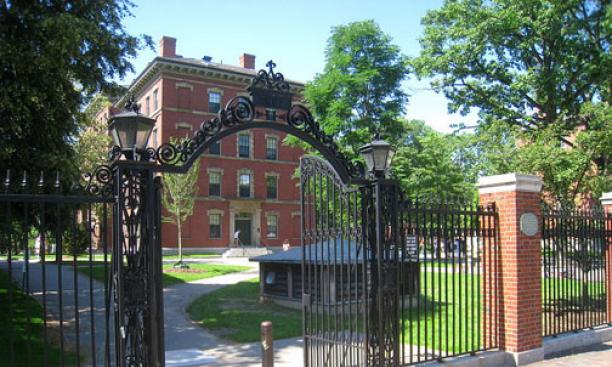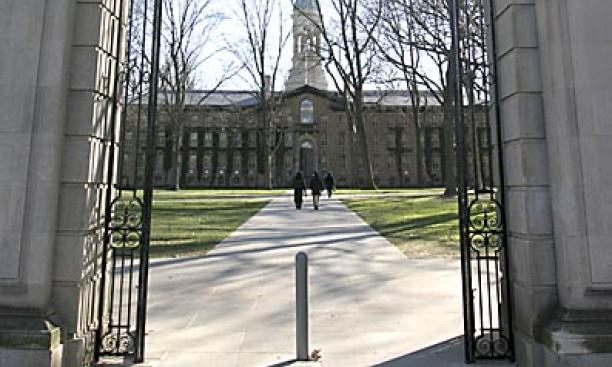
Unless we stand for something, we shall fall for anything.

Although we tend to wave the treasured orange-and-black gonfalon a great deal hereabouts, the shrinking global village often leads us to suspect that institutions are becoming increasingly homogeneous [insert your favorite college home page here]. Especially such exciting infrastructure goodies as, oh, academic administration [insert your favorite VP title here]. In the case of academic standards and discipline, it is surprising to find that’s not true, not even close. Ivy League current events provide an instructive (you’ll pardon the term) example, and it’s a good time to consider what all the hubbub is really about.
There are basically two polar approaches to controlling academic malfeasance, both of which are alive and well. The first is to treat teaching as the faculty’s job, and have faculty members police it. The second is to regard learning as the students’ job, and have them police it. Flowing from those two are a variety of gradations that combine mixed authority and responsibility. The student-powered versions, usually tagged with terms like honor code or honor system, sound vaguely like something touchy-feely out of the ’60s, but they actually trace back to 1779 at William & Mary and since have extended broadly but quirkily. Rigid, all-encompassing (academic and social) honor systems are now legendary at the military academies, but other types hold sway at such institutions as Bryn Mawr, Harvey Mudd, Haverford, Stanford, and a wide range of law and medical schools. And of course Princeton, where the honor system covers all written exams. For some reason, the Ivies rarely have been interested; the only other one is at Dartmouth, which since 1962 not only involves self-proctored exams but all academics, and is adjudicated by a committee that is 40 percent students. Elsewhere – including Cornell, which tried a system a century ago and gave it up – the faculty simply kicks ass and takes names.
Which brings us to our Puritan brethren in Cambridge. In a large Harvard survey course last May, one grader recognized the similarity of some take-home exam responses, went to the professor, and when the smoke cleared:
- By August, half of the 280 students in the course were under investigation for plagiarism and/or collaboration. Harvard felt it had no choice but to go public with the situation ( The Crimson , which has covered the case exhaustively, would have blown it open anyway).
- Those involved therefore felt the need to respond publicly in various ways, amounting to mass confusion, which played out in The Boston Globe, The New York Times, and elsewhere. Students, course assistants, and various college academic authorities seemed to have differing ideas of collaboration standards and who had been told about them.
- The large number of cases took months to proceed through hearings by the Administrative Board, the college judicial authority – which contains faculty and administrators but precisely zero students, adding another level of friction.
- In February, Harvard announced (again, because it had promised to) the suspension of 70 or so involved students for plagiarism and/or collaboration, and the disciplinary warning of perhaps 35 others.
- The Crimson , in apparent exasperation, then published an indictment of “The Fall of Academics at Harvard,” including a significant example of another huge course from the prior year that reportedly had similar collaboration – but no disciplinary repercussions.
In March, the misbehavior changed flavors: It was revealed the administration had surreptitiously hacked emails of resident deans (who, not incidentally, are members of the Administrative Board) in an attempt to find a leak in the case, in explicit contravention of college rules. Many of us who remember the ’70s recall that it’s not the burglary they get you for, it’s the cover-up.

By all reliable accounts, Princeton in 1893 was in much worse shape than that. Because of the pedagogy of the time, final course examinations were the supercritical academic passgates, and various forms of cribbing and connivance were not only epidemic but generally successful, and so thrived. The faculty tried various policing approaches, which were not only failures in themselves, but served to set them against the students in a contest of disrespectful deviousness that had nowhere to go but down. It was the student body, led by the Class of 1893, who called it to a halt by proposing a dramatic deal: The students would self-police all examinations, and they’d turn in and punish any of their own who cheated. The faculty approved the experiment following the impassioned speech of young professor Woodrow Wilson 1879, who had been impressed by the honor system in law school at Virginia. It was individually subscribed to on each occasion with a simple promise: “I pledge my honor as a gentleman that, during this examination, I have neither given nor received assistance.” A huge immediate success (including some turn-ins and ensuing severe penalties), it earned the praise of the College and subsequently the gravitas of longevity: To the letter, the pledge is the same one I signed 75 years later, and now is changed due only to the addition of honorable students who don’t happen to be gentlemen. In a parallel tradition that began with the Class of 1897, each freshman class meets with the Honor Committee and is introduced to the agreement, and each freshman pledges in writing to abide by it.
This, however, does not address academic activities outside classroom exams, which remain the province of the Princeton faculty. The judicial vehicle for this since time immemorial is the Committee on Discipline, which in its current incarnation has two crucial strengths: 1) In any hearing, its composition is half students and half faculty, and 2) it has its standards in writing. The specifics are contained in Rights, Rules, Responsibilities, the University’s all-purpose regulations book, and along with the Council of the Princeton University Community (CPUC) a legacy of the administrative overhaul during the Goheen administration, initiated (crucially) by the faculty itself. Guided by math/econ professor Harold Kuhn in 1968, the faculty decided that its existing authority and administrative reach were overbroad, and carefully delineated not only what needed to be done disciplinarily, but who else among the University community should be involved. While RRR has morphed somewhat in 45 years (mainly getting bigger, in the best bureaucratic tradition), the standards of plagiarism and collaboration today essentially are updated only for technology: If anybody ever even thought it before, you’d better document it, or get zapped. Ignorance of the rules or unawareness of the source is not germane; if you’ve copied, you are guilty until proven innocent. Implicit, terse message: This is for everyone’s good, you’re being judged by your peers; be thorough, be correct, be safe.

The Honor Committee and the Committee on Discipline have worked for many years. Not because people don’t cheat; they do. Not because cheaters don’t get away with it; some of them do. The committees’ existence alone defines the seriousness and cooperativeness of the community; if you cheat, you know it, and you know the import, whether or not you’re caught. The committees work and are supported because students – most of them, anyway – believe the standards they represent, and openly accept them as legitimate for the betterment of their community, their friends, themselves. When questioned by The Crimson about the Harvard mess, the senior chairwoman of Princeton’s Honor Committee simply said that she couldn’t believe no student had reported a thing.
At a Harvard Arts & Sciences faculty meeting on Feb. 5, five months after the malfeasance and PR news broke, the Dean of Undergraduate Education recounted the prior two years of working on approaches to cheating and cited a broad range of possible options, which he pointedly noted would not include any provisions requiring students to report on violations of community standards, which “don’t work.” This might prove a surprise in Hanover or Princeton. Going into such discussions with the assumption that highly accomplished students can’t be trusted is tacitly a comment on the lack of community, and in light of others’ experience, disturbing.
The point of the Honor System after all is not to punish, to make grading fair, or to show the various faculties and administrators of this world what snazzy grownups we are. Whether or not we ever cheat, whether or not we’re ever caught, it’s a potent vehicle to help us wake up on our own; to be our own best teachers. In the admirable words of Tiger offspring (and Bryn Mawr alumna) Drew Gilpin Faust k’42 last September, “[Integrity] is what each of us owes to ourselves.” She of course is president of Harvard.
